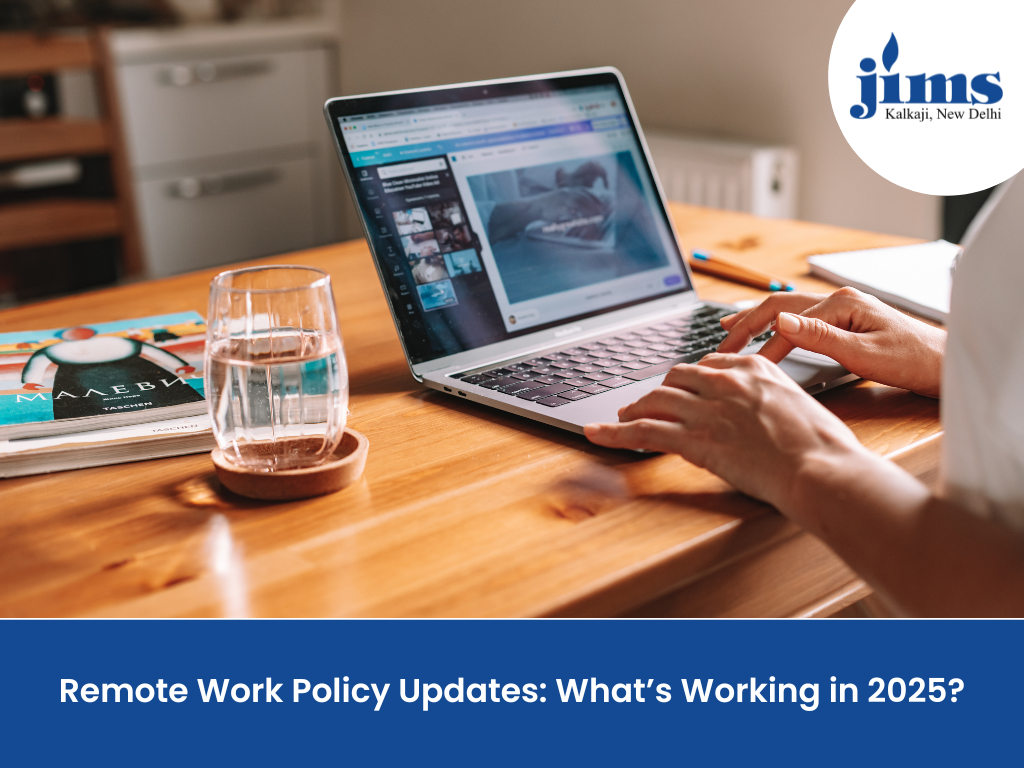
DR. SHIVANI SHARMA
ASSISTANT PROFESSOR
The world of work has undergone a dramatic transformation in the past few years, and 2025 continues to shape the future of how organizations operate. Remote work, once a temporary solution to a global crisis, has now become a cornerstone of corporate strategy. As Human Resource professionals adapt to this evolution, institutions like Jagannath International Management School (JIMS, Kalkaji) are playing a crucial role in preparing future leaders to navigate these challenges with agility and insight.
The Evolution of Remote Work Policies
Gone are the days of hastily put-together work-from-home policies. In 2025, successful organizations are embracing hybrid flexibility, asynchronous communication, and results-oriented performance. HR departments are crafting policies that go beyond logistics—they focus on employee well-being, digital infrastructure, and inclusive work cultures.
What’s Working in 2025?
- Hybrid Work with Clear Boundaries
Companies now offer flexible hybrid models, typically 2–3 days in-office, with clearly defined expectations. This structure provides a balance between collaboration and individual productivity, preventing burnout while maintaining team cohesion.
- Mental Health Integration
Mental health is no longer an afterthought. Progressive HR policies now include mandatory “mental health days,” virtual counselling sessions, and wellness stipends. At JIMS, the importance of mental health is emphasized in HRM curriculum, teaching students to prioritize employee support systems.
- Asynchronous Communication Culture
With global teams, the 9–5 schedule doesn’t always fit. Leading companies are promoting asynchronous communication through platforms like Slack and Notion, reducing pressure and improving workflow across time zones.
- Performance Over Presence
HR teams have shifted from monitoring hours to evaluating outcomes. Transparent goal-setting and key performance indicators (KPIs) are the foundation of modern remote performance management.
- Upskilling for the Digital Workplace
Remote success requires digital fluency. Companies are investing in training programs to improve soft skills, tech adaptability, and remote collaboration. JIMS integrates digital transformation modules into its management programs to ensure students are future-ready.
The Role of HR in Sustaining Remote Work Success
HR leaders are now the architects of sustainable remote ecosystems. They are investing in tools to monitor engagement, create virtual culture touchpoints, and ensure equity across remote and in-office employees.
At Jagannath International Management School (JIMS), students are encouraged to critically evaluate case studies on remote work, offering insights into real-world HR strategies. With a curriculum designed to reflect industry needs, JIMS continues to produce HR professionals who can adapt to, and lead in, the evolving workplace.
Conclusion
Remote work in 2025 is no longer a novelty—it’s a strategic imperative. Organizations that continue to innovate their remote work policies will attract and retain top talent. As institutions like JIMS equip future HR professionals with the tools to succeed in this dynamic landscape, the future of work looks not only flexible but profoundly human-centred.

